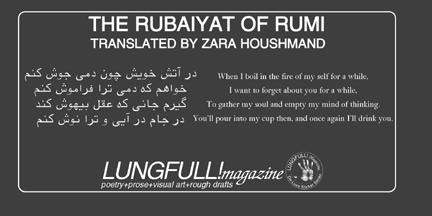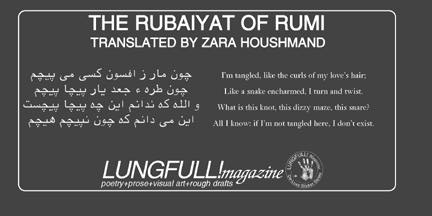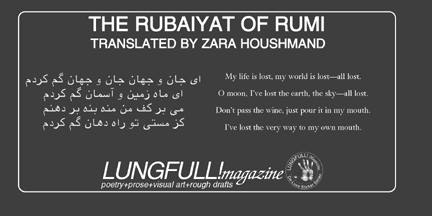
Poem Stickers.
The Rubaiyat of Rumi
Translated by Zara Houshmand



Zara Houshmand on Rumi
These rubaiyat, or quatrains, were composed by Jalal al-Din Rumi, a thirteenth century Muslim theologian and Sufi mystic, and one of the greatest poets of the Persian language. They are a selection from almost two thousand such quatrains that, insofar as the attribution to Rumi can be trusted, were largely composed over a period of about two years, when Rumi was intensely affected by his relationship with Shams al-Din Tabrizi, his spiritual mentor and soul-mate.
That Rumi chose to address to his spiritual guide a vast body of poetry couched in the language and themes of romantic love is explained by a confluence of literary convention and the ecstatically devotional mystical path that Rumi and Shams travelled together. Rumi's genius lies in the utter sincerity with which he assumes the mask of convention to send these very direct and deceptively simple reports from the battle-front of an emotionally turbulent struggle of the spirit.
The poems were often composed extemporaneously in the midst of the meditative whirling dance that was an important aspect of Rumi's practice, and their musical quality is pronounced, with strongly rhythmic meters. The standard AABA rhyme scheme is elaborated with much internal rhyme that is not formally required. Many poems repeat the same word or phrase after the rhyme word, with an effect that may be as strong as a refrain or as light as a feminine rhyme. I have not tried to duplicate the meter or rhyme, but only to introduce as much musical effect into the English as I could without compromising the sense.
For more information on Rumi, visit the iranian.com
LUNGFULL!magazine
home * current issue * archives
in the house * submit * subscribe * faq's
special events *linkfull * contact us